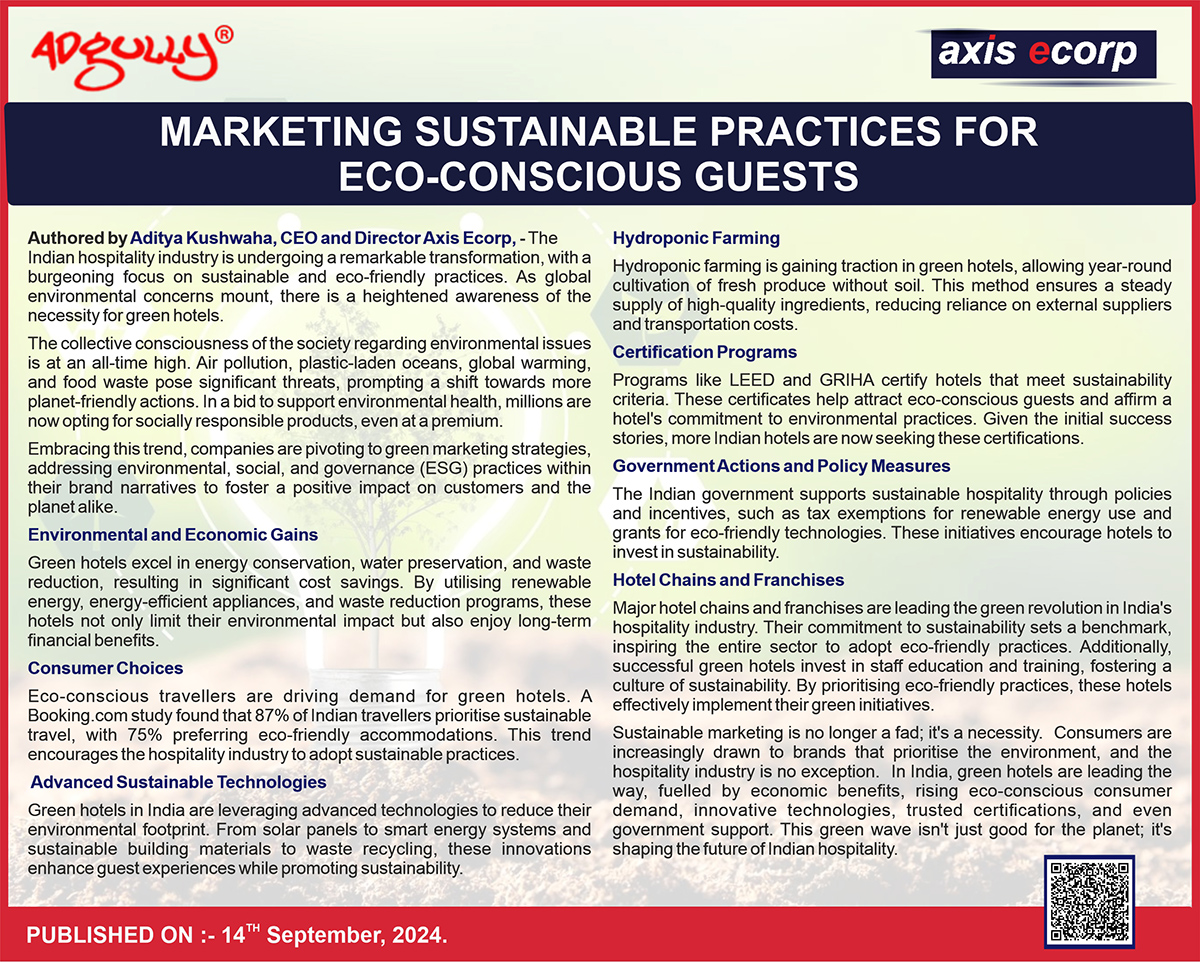Marketing Sustainable Practices for Eco-Conscious Guests

Authored by Aditya Kushwaha, CEO and Director Axis Ecorp
The Indian hospitality industry is undergoing a remarkable transformation, with a burgeoning focus on sustainable and eco-friendly practices. As global environmental concerns mount, there is a heightened awareness of the necessity for green hotels.
The collective consciousness of the society regarding environmental issues is at an all-time high. Air pollution, plastic-laden oceans, global warming, and food waste pose significant threats, prompting a shift towards more planet-friendly actions. In a bid to support environmental health, millions are now opting for socially responsible products, even at a premium.
Embracing this trend, companies are pivoting to green marketing strategies, addressing environmental, social, and governance (ESG) practices within their brand narratives to foster a positive impact on customers and the planet alike.
Environmental and Economic Gains
Green hotels excel in energy conservation, water preservation, and waste reduction, resulting in significant cost savings. By utilising renewable energy, energy-efficient appliances, and waste reduction programs, these hotels not only limit their environmental impact but also enjoy long-term financial benefits.
Consumer Choices
Eco-conscious travellers are driving demand for green hotels. A Booking.com study found that 87% of Indian travellers prioritise sustainable travel, with 75% preferring eco-friendly accommodations. This trend encourages the hospitality industry to adopt sustainable practices.
Advanced Sustainable Technologies
Green hotels in India are leveraging advanced technologies to reduce their environmental footprint. From solar panels to smart energy systems and sustainable building materials to waste recycling, these innovations enhance guest experiences while promoting sustainability.
Hydroponic Farming
Hydroponic farming is gaining traction in green hotels, allowing year-round cultivation of fresh produce without soil. This method ensures a steady supply of high-quality ingredients, reducing reliance on external suppliers and transportation costs.
Certification Programs
Programs like LEED and GRIHA certify hotels that meet sustainability criteria. These certificates help attract eco-conscious guests and affirm a hotel's commitment to environmental practices. Given the initial success stories, more Indian hotels are now seeking these certifications.
Government Actions and Policy Measures
The Indian government supports sustainable hospitality through policies and incentives, such as tax exemptions for renewable energy use and grants for eco-friendly technologies. These initiatives encourage hotels to invest in sustainability.
Hotel Chains and Franchises
Major hotel chains and franchises are leading the green revolution in India's hospitality industry. Their commitment to sustainability sets a benchmark, inspiring the entire sector to adopt eco-friendly practices. Additionally, successful green hotels invest in staff education and training, fostering a culture of sustainability. By prioritising eco-friendly practices, these hotels effectively implement their green initiatives.
Sustainable marketing is no longer a fad; it's a necessity. Consumers are increasingly drawn to brands that prioritise the environment, and the hospitality industry is no exception. In India, green hotels are leading the way, fuelled by economic benefits, rising eco-conscious consumer demand, innovative technologies, trusted certifications, and even government support. This green wave isn't just good for the planet; it's shaping the future of Indian hospitality.







